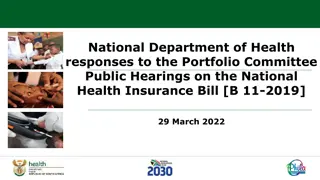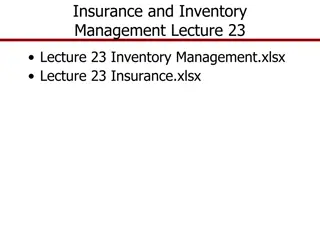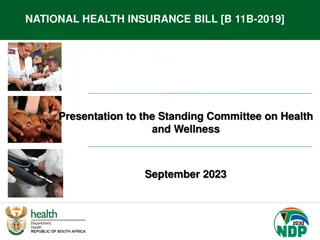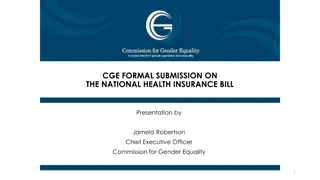ICPA Input on National Health Insurance Bill
ICPA presents its support for Universal Health Coverage through National Health Insurance, emphasizing the role of pharmacists in primary healthcare delivery. With over 1200 members committed to high-quality pharmaceutical care, ICPA urges the expedited promulgation of the NHI Act for a sustainable and equitable healthcare system in South Africa.
Download Presentation

Please find below an Image/Link to download the presentation.
The content on the website is provided AS IS for your information and personal use only. It may not be sold, licensed, or shared on other websites without obtaining consent from the author.If you encounter any issues during the download, it is possible that the publisher has removed the file from their server.
You are allowed to download the files provided on this website for personal or commercial use, subject to the condition that they are used lawfully. All files are the property of their respective owners.
The content on the website is provided AS IS for your information and personal use only. It may not be sold, licensed, or shared on other websites without obtaining consent from the author.
E N D
Presentation Transcript
ICPA Input on the NHI Bill Kgabo Komape, Mogologolo Phasha, Sham Moodley 27 July 2021
Introduction Introduction Mr Kgabo Komape Chairman ICPA
ICPA Input on the NHI Bill ICPA Input on the NHI Bill Thank you for the opportunity to present to you today. ICPA supports Universal Health Coverage and the mechanism by which we hope to achieve it, namely National Health Insurance. ICPA believes that pharmacists and pharmacies are an essential component of primary health care delivery under an NHI model
The Independent Community Pharmacy The Independent Community Pharmacy Association (ICPA) Association (ICPA) ICPA is a non-profit company which represents one of the largest pools of professionals in the healthcare sector with 1221 pharmacies, about 3500 pharmacists and 20 000 supportive healthcare personnel spread across metropolitan, urban and rural South Africa. All ICPA members are committed to high quality pharmaceutical care and to the restoration and maintenance of the health and well-being of the people of South Africa. ICPA, in the spirit of social solidarity and in recognition of the right of all citizens to healthcare, commits all our resources to assist the government realise a sustainable and equitable NHI. We commit this support in the belief that the health of a nation determines the wealth of the nation. We call on the Portfolio Committee to expedite the promulgation of NHI Act - our patients cannot wait any longer.
1221 Independent Community Pharmacy Members Across South Africa
South African Pharmacy Council South African Pharmacy Council Register of Pharmacies Register of Pharmacies Sector Academic Institution Community Pharmacy Consultant Pharmacy Institutional Private Institutional Public Manufacturing Pharmacy Wholesale Pharmacy Private Wholesale Pharmacy Public EC 2 317 164 1250 592 238 295 175 0 0 5 0 23 17 114 61 104 50 73 101 13 1 187 9 17 5 90 21 2 1 1 1 FS 0 GP KZN 3 LP 1 MP 0 NW 1 NC 0 71 0 6 28 0 3 1 WC Total 1 497 3599 1 48 133 33 30 1 1 9 0 0 0 6 10 38 1 3 1 14 45 2 3 1 18 40 5 1 1 311 612 251 173 10
South African Pharmacy Council South African Pharmacy Council Register of Pharmacists & Assistants Register of Pharmacists & Assistants Province Community Service Pharmacist 152 20 209 198 75 48 81 9 0 77 869 Pharmacists Pharmacist's Assistants Total Eastern Cape Free State Gauteng Kwazulu-Natal Limpopo Mpumalanga North West Northern Cape Unknown Western Cape Total 2280 542 5661 2481 744 815 669 263 82 2759 16296 3252 880 8222 4618 1473 1382 1075 408 423 3511 25244 5684 1442 14092 7297 2292 2245 1825 680 505 6347 42409
NHI Bill inputs Mr Mogologolo Phasha ICPA Director NHI Portfolio
NHI Bill : Definitions NHI Bill : Definitions Comprehensive health care services Comprehensive health care services Pharmacists provide comprehensive health care services, as defined in the NHI Bill,through the provision of pharmaceutical care. Pharmaceutical care is a patient-centered, outcomes-oriented pharmacy practice that requires the pharmacist to work in concert with the patient and the patient's other healthcare providers to promote health, to prevent disease, and to assess, monitor, initiate, and modify medication use to assure that drug therapy regimens are safe and effective. The goal of Pharmaceutical Care is to optimise the patient's health-related quality of life, and achieve positive clinical outcomes, within realistic economic expenditures.
NHI Bill : Definitions NHI Bill : Definitions primary health care primary health care means addressing the main health problems in the community through providing promotive, preventive, curative and rehabilitative services and (a) is the first level of contact of individuals, the family and community with the national health system, bringing health care as close as possible to where people live and work, and constitutes the first element of a continuing health care process; and (b) in the public health sector, is the clinic, and in the private health sector, is the general practitioner, primary care nursing professional, primary care dental professional and primary allied health professional, through multi-disciplinary practices;
Community Pharmacies Community Pharmacies In South Africa, independent community pharmacies are often the first level of contact for health-related matters as they are recognised as trusted and accessible centres of primary healthcare that provide promotive, preventative, curative and rehabilitative services.
Promotive & Public Health Services Promotive & Public Health Services Lifestyle Programmes Lifestyle Modification Smoking cessation Weight control Alcohol abstinence Substance Abuse programmes Eating Plans Exercise regimens Sleep hygiene Stress relief programmes
Preventative Health Care Services Preventative Health Care Services Screening Tests Vaccinations Sexual Health Blood pressure Blood glucose and HbA1c Blood cholesterol and lipograms BMI, waist circumference, hip to waist ratios HIV & TB screening Expanded programme of immunisation Influenza vaccinations Covid-19 vaccinations Family planning Emergency Contraceptive prescribing PrEP and PEP initiation and dispensing Pregnancy testing
Curative Care Services Curative Care Services Chronic Disease Management Acute disease management Dispensing services Adherence programmes Therapeutic outcomes monitoring Treat to target services Adverse drug reaction management Pharmacist Initiated Management of Antiretroviral Therapy PIMART Dispensing antibiotics for acute bacterial infections Antimicrobial stewardship managing viral infections without antibiotics Pharmacist Initiated Therapy OTC medicines
Rehabilitative Services Rehabilitative Services Supporting Independence Rehabilitation Ambulatory aids e.g. walking frames Surgical equipment e.g. wheelchairs Unit Dose Dispensing Home services and telemedicine Medicine deliveries
Palliative Care Palliative Care Pain Management Support Medicine dispensing and monitoring Pain management plans Multi-disciplinary team Total Parental Nutrition (TPN) preparation Incontinence care Stoma equipment and services Oxygen/nebuliser hire
Recommendations Recommendations We recommend the inclusion of pharmacists in the definition of primary healthcare. As we strive to achieve ONE healthcare system, we also recommend the removal of the reference to public health sector and private health sector.
primary health care primary health care means addressing the main health problems in the community through providing promotive, preventive, curative and rehabilitative services and (a) is the first level of contact of individuals, the family and community with the national health system, bringing health care as close as possible to where people live and work, and constitutes the first element of a continuing health care process; and (b) is represented by primary care health professionals including but not limited to; the general practitioner, the professional nurse, pharmacist, dentist and allied health professional, through multi-disciplinary practices;
Chapter 2 Chapter 2 ACCESS TO HEALTH CARE SERVICES ACCESS TO HEALTH CARE SERVICES Population coverage 4. (2) An asylum seeker or illegal foreigner is only entitled to (a) emergency medical services; and (b) services for notifiable conditions of public health concern. Since the health of the nation is influenced by the health of all within the country, we advocate for the inclusion of this sector of the population to be included under UHC in the NHI. It is our belief that exclusion of any of SA inhabitants will be counterproductive fueling the spread of disease and adding to the burden of disease.
Establishment of Fund Establishment of Fund Functions of Fund 10. (1) To achieve the purpose of this Act, the Fund must (k) ensure that health care service providers, health establishments and suppliers are paid in accordance with the quality and value of the service provided at every level of care; The quality measures that will apply to pharmacies are not specified. It is important for these to be stipulated so that pharmacists know what their services will be measured against and to enable compliance. We trust that these will be detailed in the Regulations to the Bill.
Registration as users Registration as users 11. (2) The Fund may enter into a contract for the procurement and supply of specific health care services, medicines, health goods and health related products with an accredited health care service provider, health establishment or supplier, and must (e) negotiate the lowest possible price for goods and health care services without compromising the interests of users or violating the provisions of this Act or any other applicable law. ICPA would like to add that such negotiation should also not compromise the viability and sustainability of independent community pharmacies as these establishments are already heavily regulated by Single Exit Price of medicines and legislated dispensing fees which leaves them vulnerable to draconian cost cutting measures. The successful implementation of NHI needs a wide network of community pharmacies that will provide broad and equitable access to the population to ensure a viable pharmaceutical services model.
Chapter 7 Chapter 7 ADVISORY COMMITTEES ESTABLISHED BY MINISTER ADVISORY COMMITTEES ESTABLISHED BY MINISTER Benefits Advisory Committee - must consist of persons with technical expertise in medicine, public health, health economics Medicine, as defined in the NHI Bill reads as follows: medicine means medicine as defined in section 1 of the Medicines and Related Substances Act, 1965 (Act No. 101 of 1965); The ICPA trusts that such expertise does in fact include experts in pharmacy. In this regard, the ICPA assumes that medicine as it is included herein pertains to the definition of medicine as provided in the Bill and that the persons with technical expertise in medicine is a pharmacist or pharmacologist and not a person with a degree in medicine .
Office of Health Products Procurement Office of Health Products Procurement 38. (3) The Office of Health Products Procurement must (a) determine the selection of health-related products to be procured; (b) develop a national health products list; ICPA submits that the selection of health-related products to be procured, mentioned in 38. (3)(a), must be done in collaboration with the Contracting Units for Primary Healthcare (CUPS) to ensure that Sub District demographics and disease burden profiles are taken into consideration and the Sub District specific needs are addressed.
Accreditation of service providers 39. (2) In order to be accredited by the Fund, a health care service provider or health establishment, as the case may be, must (a) be in possession of and produce proof of certification by the Office of Health Standards Compliance and proof of registration by a recognised statutory health professional council The pharmacy profession is regulated by the South African Pharmacy Council (SAPC) that is mandated by the Department of Health to ensure quality care and patient safety. This statutory body is also responsible for enforcing Good Pharmacy Practice (GPP); this set of rules is also included during the evaluation of pharmacy license applications. Since the adjudication process is in place, and to prevent duplication of effort, we suggest that any additional determination by the OHSC be added to the SAPC inspection and that the OHSC delegate the responsibility to the SAPC to improve efficiencies.
Information platform of Fund 40 (2) Health care service providers and health establishments must submit such information as may be prescribed to the Fund, taking into consideration the provisions of the Protection of Personal Information Act, 2013 (Act No. 4 of 2013). (3) The information in subsection (2) may be used by the Fund to (f) determine the payment mechanisms and rates for personal health care services. ICPA submits that the payment mechanisms and rates for personal healthcare services must include input from all stakeholders including representatives of the pharmaceutical sector. This cannot be a unilateral process without the said inputs that will inform the Fund on the operational challenges and evolving landscape that must be considered when making decisions.
Payment of health care service providers 41. (3) (a) An accredited primary health care service provider must be contracted and remunerated by a Contracting Unit for Primary Health Care. A Contracted Unit for Primary Health Care or CUP, as per the proposed model will as a minimum consist of a general practitioner (GP), a nurse, a dentist and a pharmacy. The GP, nursing and dental services are conducive to a capitation reimbursement model. Pharmacies on the other hand are not as easily accommodated in the capitation model. Pharmacy service include the provision of medicines which have a fixed cost and are dictated by the activities of the other partners in the Contracting Unit. An alternate reimbursement model will have to be established that takes the unique operational and infrastructure costs applicable to pharmacies.
Definitions of health worker and health care provider Due to historical professional demarcations pharmacists are often omitted from definitions for healthcare providers. Pharmacy has rapidly evolved over the past few decades transforming the old chemist to patient-oriented clinical pharmacists who are a highly accessible provider of primary healthcare services. It is critical that pharmacists be included in the definition of health care provider .
Medicines and related substances Act At this juncture, ICPA recommends that the Portfolio Committee also review Section 22A(14)(b) of the Medicines and related substances Act, 101 of 1965 be amended to read: no nurse, pharmacist or a person registered under the Health Professions Act, 1974, or similar Act, other than a medical practitioner or dentist, may prescribe a medicine or Scheduled substance unless he or she has been authorised to do so by his or her professional council concerned.
Medicines and related substances Act Further, Section 22A(17)(a) of the Medicines and related substances Act, 101 of 1965 be amended to read: authorised prescriber means a medical practitioner, dentist, veterinarian, practitioner, nurse, pharmacist or other person registered under the Health Professions Act, 1974; Pharmacists prescribe unscheduled, schedule one and schedule two medicine when treating minor ailments and, as seen in other countries that have a mature national health service, there is a move to decant patients with minor ailments away from overburdened clinics, emergency rooms and GP down to pharmacy level. SA can leapfrog our NHI by taking cognizance of the weaknesses in other systems by including pharmacy as a PHC point of care from the outset.
Our Future Pharmacists Our Future Pharmacists Nelson Mabusela President of the South African Pharmaceutical Students' Federation (SAPSF) University NELSON MANDELA UNIVERSITY NORTH-WEST UNIVERSITY RHODES UNIVERSITY SEFAKO MAKGATHO HEALTH SCIENCES UNIVERSITY TSHWANE UNIVERSITY OF TECHNOLOGY UNIVERSITY OF KWAZULU-NATAL UNIVERSITY OF LIMPOPO (TURFLOOP CAMPUS) UNIVERSITY OF LIMPOPO MEDUNSA CAMPUS UNIVERSITY OF THE WESTERN CAPE UNIVERSITY OF WITWATERSRAND Total 1st year 2nd year 3rd year 4th year Total 104 121 157 206 177 244 16 162 185 25 66 60 46 114 106 119 56 76 0 0 31 116 140 97 93 104 709 963 1137 132 248 183 70 63 127 72 1 138 82 1116 514 875 546 214 217 466 291 1 425 376 3925 53 48 87 0
Concluding Remarks Concluding Remarks Dr Sham Moodley Deputy Chair ICPA







![Stakeholders' Responses to National Health Insurance Bill [B.11B-2019]: Overview](/thumb/69945/stakeholders-responses-to-national-health-insurance-bill-b-11b-2019-overview.jpg)















